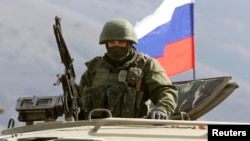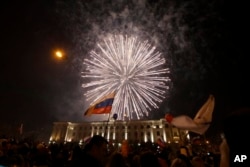Authorities in Russia-annexed Crimea have released a journalist affiliated with the U.S.-funded Radio Free Europe / Radio Liberty on bail, but with travel restrictions, according to a report quoting his lawyer.
Prosecutor General of Crimea Natalya Poklonskaya says a criminal case has been launched against the journalist, named as Nikolai Semena, for alleged “extremism” and supporting “violations of Russia’s territorial integrity.”
Russia’s parliament made questioning the country's territorial integrity a criminal offense shortly after it approved the March 2014 annexation of Crimea from Ukraine. If found guilty, Semena could get up to five years in prison.
Poklonskaya claims Semena has published reports on the Radio Liberty program Crimea Realities in support of Ukrainian activists’ trade blockade of the Black Sea peninsula.
"In this article, and in a number of other publications prepared by this media representative, there are justifications for subversive activities,” Poklonskaya told Russian state media, “which have been conducted against all Crimeans, justification for terrorist intent ... as well as calls for extremist activities.”
Crimea Realities quoted Semena’s lawyer, Emil Kurbedinov, saying the journalist denied the charges and had not worked for the program since 2014. Semena also previously worked for a Ukrainian newspaper and a Russian newspaper.
Semena was detained Tuesday during a series of raids on homes in Crimea that also targeted other journalists. Crimean authorities say they seized computers and documents to be used as evidence.
RFE/RL's web site quoted the broadcaster's editor in chief, Nenad Pejic, as saying "Police conducted forced searches at the homes of seven people across Crimea, including some RFE/RL correspondents." While RFE's report did not give Semena's name, Pejic said one of the journalists now faced criminal charges based on his work.
Pejic described the broadcaster's Crimea web site as one of the "last remaining sources of independent news" on Crimea.
The the Broadcasting Board of Governors (BBG), which oversees VOA, RFE/RL and three other U.S. broadcasting entities, condemned "the targeting of independent journalists in Russia-annexed Crimea."
“The charges being considered against Semena are baseless and are aimed only at silencing independent voices and dissent,” BBG CEO and Director John Lansing said. “Threats to the free practice of journalism must neither be made nor tolerated by any government.”
OSCE Representative on Freedom of the Media Dunja Mijatović expressed concern about what she called the intimidation against Semena and other journalists.
“This recent detention only shows the urgent need to stop the arbitrary practice of silencing journalists in Crimea,” Mijatović said.
The raids come just a day after Russia’s top investigator called for the criminal prosecution of anyone denying the results of the internationally dismissed referendum in Crimea that Moscow used to justify annexing the peninsula. Alexander Bastrykin, the head of Russia’s Investigative Committee, said in an opinion piece published in a Russian magazine that denial of the referendum’s legitimacy should be equated with extremist activity.
The rushed vote in Crimea was held after Russian special forces seized Ukrainian military bases there. The referendum included only two options - independence or joining Russia. Moscow claimed nearly 97 percent of Crimeans supported becoming part of Russia.
Bastrykin says his proposal to criminalize questioning the referendum's results was part of a series of tough measures is a response to what he called a “hybrid war unleashed by the U.S. and its allies.” The restrictions included Internet and media censorship using China as a model.
Poklonskaya, the Crimean prosecutor, declared her approval of Bastrykin’s proposal. On Tuesday, Russia’s Justice Ministry suspended the Crimean Tatars’ highest ruling body, the Mejlis, for “extremist activities.”
Tatars make up about 12 percent of Crimea's population and openly opposed Russia’s annexation. The ministry said the ban was based on an order by Poklonskaya.
Bastrykin’s statement was not purely personal opinion, but part of a shift to more authoritarian stance taken by the Russian government to head off any challenges, New York University Professor of Global Affairs Mark Galeotti told VOA in an interview via Skype.
“And, this means everything from, let’s say, the rising tide of labor unrest across the country to Tatar militants within the Crimea. So, I think it’s a sense of a fear that things might spin out of control, especially as we move toward election season,” he said. “So, I think it does definitely speak to a new, rather more paranoid and certainly worried mood within the Kremlin."
RFE/RL receives funding from the United States government. Like Voice of America, it is overseen by the Broadcasting Board of Governors.





